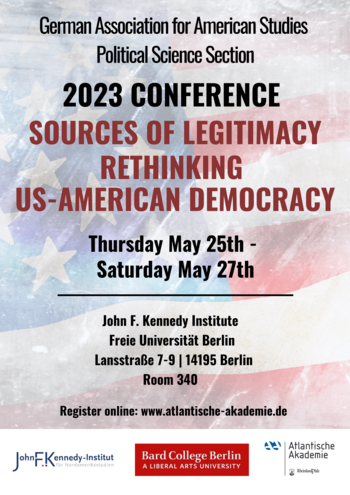Sources of Legitimacy: Rethinking US-American Democracy
Date: May 25-27, 2023
Location: John F. Kennedy Institute, Freie Universität Berlin
Registration:Please register here until May 18, 2023.
An attempted coup, voting rights at peril, a loss of trust in politicians and political institutions: no end to the ongoing crises shaking American democracy seems in sight. The legitimacy of central political institutions and actors are under threat. Meanwhile, the international liberal order, which created the framework for American Political Development in the post-World War II moment, is being put into question by the Russian attack on Ukraine and new power blocs undermining American hegemony.
Legitimacy can be understood as a multi-dimensional concept, encompassing beliefs on the proper sources, values, goals, procedures, and outcomes of a given institutional order. Considering that both the domestic political order in the United States as well as the international order built around American hegemony have come under immense pressure, this conference will provide a forum to discuss the crises of legitimacy of relevant institutions, ideals and actors.
Which normative ideals have sustained the legitimacy of political institutions and ideals at home and abroad? Why is it that the legitimacy of these institutions and ideals are being questioned so fundamentally at this particular historical moment? What are the consequences of a lack of stability at home for the functioning of democratic institutions? How, if at all, can the legitimacy of democratic institutions be restored? In which ways is the international order changing and how does this affect the legitimacy of the United States as a global actor? In which ways are the national and the global crisis tendencies connected?
These questions and more will be discussed at the 2023 GAAS Political Science Section conference.
Program
Thursday, May 25, 20232:30-3:00 pm
Introduction
Christian Lammert / David Sirakov / Boris Vormann / Sarah Wagner
Welcome and Introduction to the Conference
3:00-4:30 pm
Panel 1: Polarization and Anti-Government Sentiments
Chair: Boris Vormann
Claudia Franziska Brühwiler, University of St. Gallen
Beyond Trumpists and Claremonsters: Forging a Postliberal Consensus?
Marcel A. Bloch, University of Tuebingen
“No longer a Government of the People, for the People, and by the People – The Populists' New Offer to Gilded Age America”
Charlie Kleinfeld, Leipzig University
The Anti-Woke Right
Stefanie Wallbraun, University of Heidelberg
The Insurrectionist Idea in Contemporary American Gun Culture
4:30-5:00 pm: Coffee break
5:00-6:30 pm
Keynote:
Michael Doyle (Columbia University): Cold Peace: Avoiding the New Cold War
9:00-10:30 am
Panel 2: Inequality and Racism
Chair: Christian Lammert
Anthony J. Obst, GSNAS, FU Berlin
“Challenging the Legitimacy of Racialized Class Rule: Black Communist Critiques of American Democracy in the 1930s”
Shasha Lin, Heidelberg University
Institutional Trust and Policy Acceptance: Chinese Americans’ Perceptions of College Admissions and Attitudes toward Affirmative Action
Laura Kettel, Aarhus University
The Politics of Preemption: Determinants of Local Interventions in Housing Policy
Kexin Chen, JFKI, FU Berlin
Re-politicizing the Global Supply Chain: Inequality and Democratic Backsliding
10:30-11:00 am
Coffee break
11:00 am -12:30 pm
Public Interest Panel
Margit Mayer (JFKI Berlin) / Heike Paul (University of Erlangen-Nuremburg) / Michael Dreyer (University of Jena)
12:30-2:00 pm
Lunch break
2:00-3:30 pm
Session 3: Elections
Chair: David Sirakov
Rachel Blum, University of Oklahoma
Seth Masket, University of Denver, and
Mike Cowburn, Europa-Universität Viadrina Frankfurt (Oder)
Who Decides? Media, MAGA, Money, and Mentions in the 2022 Republican Primaries
Julia Simon, Helmut Schmidt University Hamburg
The Long 2020 Election & the Effects of Epistemological Populism on the Local Level
Caroline Leicht, University of Southhampton
McKinnon for President – A Comparative Analysis of Gendered Framing in Election Coverage in Political Satire and Traditional News Media
Jörg Hebenstreit, University of Jena
“In Blockchain We Trust!” – Distributed Ledger Technology (DLT) as a Remedy for Distrust in the Electoral Process?
3:30-4:00 pm
Coffee break
4:00-6:00 pm
Panel 4: Government Institutions and Separation of Powers
Chair: Laura Kettel
Maciej Turek, Jagiellonian University in Kraków
State of Democracy in the post-January 6 United States
Alexander Brackebusch, Ludwig-Maximilians-Universität München
Transformed Conceptions of the Role and Legitimacy of the U.S. Presidency
Jakob Wiedekind, Leibnitz-University Hannover
Taking the last Stronghold? Analyzing Executive Pressure on Authorization Legislation in Foreign Policy
Tim Haas, Jena University
The Legitimacy of the Vice President in the US American Political System
Paweł Laidler, Jagiellonian University in Kraków
How Democratic and Legitimate is the U.S. Constitution in 2023?
9:00-10:00 am
Business Meeting
10:00-11:30 am
Panel 5: Security and International Relations
Chair: Sarah Wagner
Holger Janusch, Hochschule des Bundes für öffentliche Verwaltung / Daniel Lorberg, Bergische Universität Wuppertal
Digitalization, Trumpismo, and the End of the Liberal World Order? Turning Points and Caesarism in Neo-Gramscianism
Carlos Álvarez-Marín, University of Guadalajara
A nation to be defended? Racism and border security in the US during the Donald J. Trump administration
Philipp Adorf, Bonn University
Affective Polarization, White racial Consciousness and America’s Future Foreign Policy: Are We Entering a new Isolationist Era?
Gordon M. Friedrichs, Freiburg University, and Florian Böller, TU Kaiserlautern
Does Anybody Care? How Domestic Polarization shapes U.S. International Relations
1:00 pm: Lunch snack and departures

